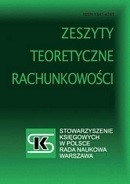Rachunkowość w zarządzaniu majątkami ziemskimi w Polsce w epoce oświecenia
Estate accounting in the period of Enlightenment in Poland
Author(s): Mikołaj TurzyńskiSubject(s): Economy
Published by: Stowarzyszenie Księgowych w Polsce
Summary/Abstract: This paper presents the concept of estate accounting in Poland in the second half of the eighteenth century. In light of the study of historical sources it must be assumed that estate accounting, derived from chamber accounting, developed during the Enlightenment period. Estate accounting fulfilled the needs of efficient administration in landed estates which carried out agricultural, commercial and industrial activity. The term „government” used at that time includes many elements identical to the modern understanding of management accounting: measurement, monitoring and control, implementation of the owner’s objectives, and communication. The concept of managerial accounting of the second half of the eighteenth century is characterized by: 4) element of human resource management, 5) incentive systems, 6) optimization of organizational structures in terms of control and supervision, 7) expectations of credibility and reliability of accounting records, 8) communicating processes, including extensive internal reporting. An important role was attributed to the planning procedures and the ethical principles formulated from the viewpoint of the owners of property (loyalty to superiors, diligence, prudence, high morals, and accuracy).
Journal: Zeszyty Teoretyczne Rachunkowości
- Issue Year: 2011
- Issue No: 63
- Page Range: 93-106
- Page Count: 15
- Language: Polish

